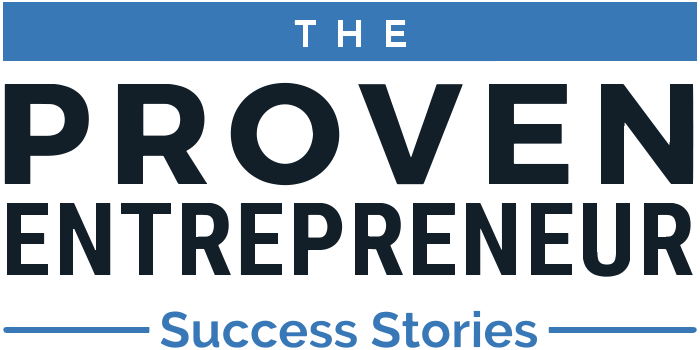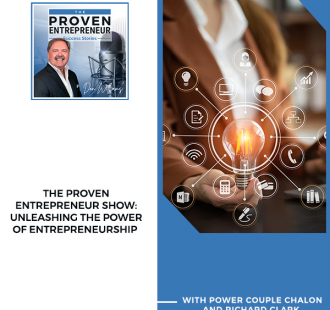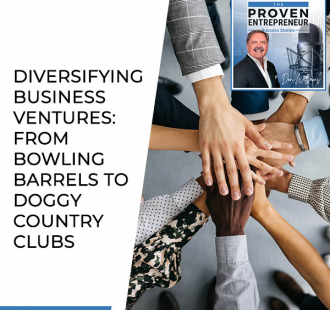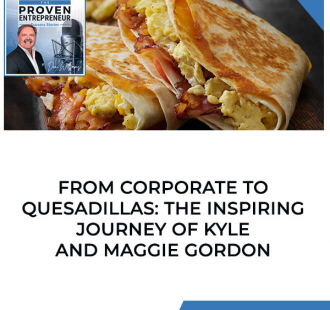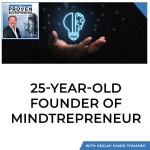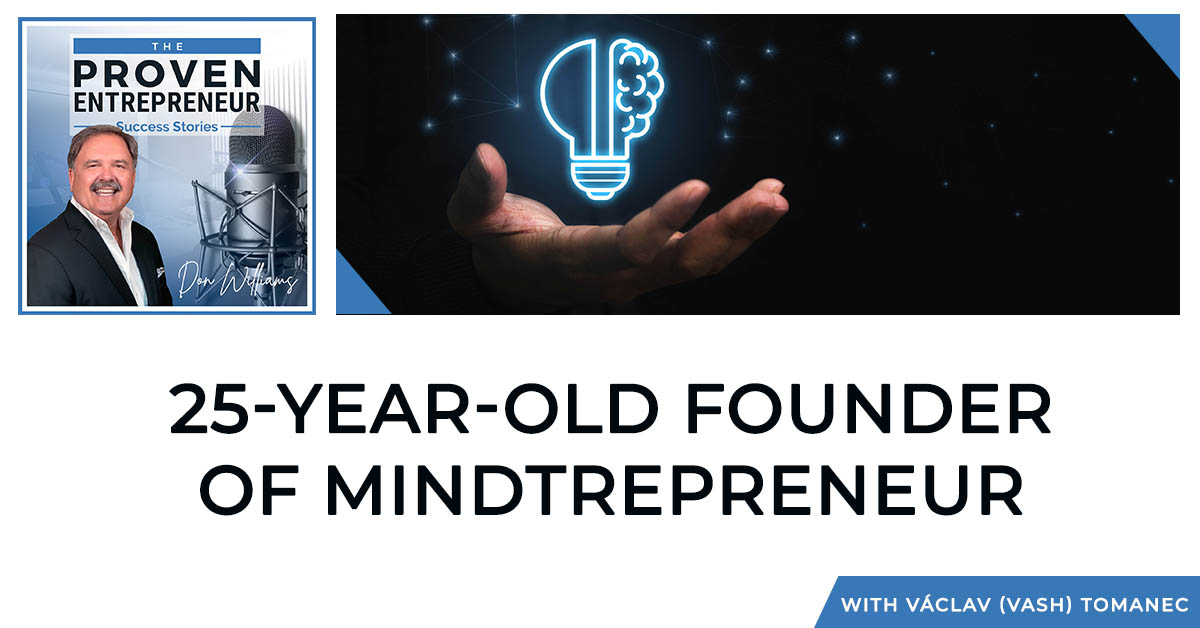
One of the great things about entrepreneurship is that there is almost no barrier to entry. Not even being young can keep you from being an entrepreneur. Just like this episode’s guest, Václav (Vash) Tomanec. At just 25 years old, Vash has already become a serial entrepreneur, building three successful seven-figure businesses. His latest venture, Mindtrepreneur, is all about helping entrepreneurs transform their business and lives by mastering their mindset. In this conversation, he joins Don Williams to share with us his amazing journey of becoming the “accidental entrepreneur” and what he learned about hard work, commitment, and perseverance. Vash then dives deep into the power of our minds. When we learn how to visualize, we can create the belief that something is possible. And Vash has the story that illustrates what the mind can do to our lives when we just work with it. Join him in today’s show to learn and be inspired to reach our goals. After all, it’s all in your mind.
For information on how to work with Don visit Work With Don Williams
You can also reach out to Don Williams at https://donwilliamsglobal.com
Please join Don and his businesses in support of St. Jude’s Children Research Hospital in its Mission to cure Childhood Cancers. You can donate to St. Jude at stjude.org/donate
—
Watch the episode here
Václav (Vash) Tomanec – 25-Year-Old Founder Of Mindtrepreneur
It’s All In Your Mind
We have a great guest in this episode. All the way from the Czech Republic, we have Vash Tomanec. Vash, though very young, is high mileage. He has accomplished a lot. Vash is a serial entrepreneur. His newest venture is Mindtrepreneur. He spent seven days in total darkness with no food in the interest of exploring his mind and meditation. I am very interested to talk about that. Another huge milestone is Vash was awarded the Two Comma Club with Russell Brunson. That’s a pretty exclusive group who’ve done that. Welcome to the show, Vash.
Thank you so much for having me, Don.
I am thrilled to have you. It is an honor. Thank you so much. Let me take you back to little Vash. From 5 to 15 years old in the home you were raised in for the most part, was there an adult who set an entrepreneurial example for you? Was there someone you looked up to that was entrepreneurial that planted the seed of entrepreneurship in your brain?
My parents were worried about where this came from because, in my whole family, nobody has been an entrepreneur. The idea sparked by the book, Rich Dad Poor Dad, that I believe a lot of your readers might have heard of that is from Robert Kiyosaki. That book opened my mind to what is possible because I was going through the predictable journey of primary and secondary school, university, and getting a job. I knew I will have a good job, but the idea of being an entrepreneur never came to me because I had nobody who is an entrepreneur around me. The book showed me a new reality that is possible. That’s when I decided I want to be an entrepreneur. It was at age eighteen, I believe.
I don’t know any entrepreneurs that Robert Kiyosaki has inspired but there are a lot. I can remember reading Rich Dad Poor Dad as a young man and was enthralled by the parallels between the two dads. One day, maybe I’m going to write the book, the Accidental Entrepreneur because so many of us didn’t design and engineer it. We weren’t built for it but in my life, one day I said, “I can’t follow this person anymore and I don’t know whom to follow so I’m going to lead.”
That meant I’m going to start my company because I can’t find anybody to follow. I’m certainly an accidental entrepreneur. We’re still back with young Vash. What was your first job? It may have not been a job. It may have been entrepreneurship but what was the first activity you did where you earned some money?
That was picking up potatoes in the Czech Republic when I was sixteen. That’s when I earned in a way or learned the lesson about hard work. Hard work is not always the thing that is rewarded. I was working hard, long hours, sweating in the sun, and all of these things. I was making back then probably $2 an hour. I put so much effort in and was so little reward. There was a big lesson looking back at it. It’s not always about working hard. It’s also about choosing the things to work hard on that will have some payoff associated with them.
It's not always about working hard, it's also choosing the things to work hard on that will actually have some payoff associated with it. Click To TweetIt’s working smart and hard on what you’re working smart. That works. In my first job, I was driving a tractor at wheat harvest, which is a tough job. It’s very hot, dusty, dirty, and long days but the first day I knocked down about fifteen fence posts. I took a corner a little too close and they just dropped. In the first two days, all I did was dig fence post holes, set fence posts and drop the tamp rod. That’s the hardest work I’ve ever done in my life and that pays dirt. That pays nothing. You started your first entrepreneurial journey at eighteen.
That was the idea. Robert Kiyosaki sparked the idea, but the big lesson was I thought that to be an entrepreneur, you need to have this grandiose idea. I need to start the next Tesla or Apple. These big ideas weren’t, first of all, coming to me and second, I didn’t have even the capital to start them. For the next few years, I was working part-time jobs. I went to university and was like, “Before I graduate, I want to have my business.”
A few years ago, I was still delivering food for Uber Eats at university. Every day, I would jump on a bike and deliver food for Uber Eats. That’s when I got the idea to start a marketing agency. I was three months away from graduation and this popped into my mind. I’m studying Marketing. A lot of businesses need help with that, especially online stores. That’s what I focused on. That’s when the idea came and that was my first business.
Do you still own that business?
I still do. It’s automated in a way. I have a CEO there and multiple team members. I do more the strategy high level but it wasn’t an easy journey to be honest because I work my way through there. My English wasn’t the best. It’s not my first language. I was cold calling people and was getting, “No.” I was like, “It’s difficult,” but I realized that I need to commit.
Commitment is such a huge part of the success I believe. That day, I made a commitment that for the next 90 days, every day I will send 10 personalized videos to potential customers and study sales for at least 2 hours because I wanted to be good at sales. I knew that if I get a meeting, I better close it. Lastly, I visualize the goal. I set some financial goals I want to have. I would close my eyes every morning and visualize for fifteen minutes that I’d already done it.
What happened in the next 63 days? Nothing. I sent 630 personalized videos. I got no meetings, no calls, no clients, and no money, but I knew deep down that every video is making me better. Every minute I spend learning sales, I’m improving. I knew that every day, I’m getting more conviction that it was going to work and my day is coming.
There was almost this feeling that virtually everybody was going to give up because they don’t see the results but not me. What happened next is in the next 27 days, I got multiple clients that allow me to hit the financial goal I set for myself. The moment I was graduating, I would make a profitable and successful business.
There are so many great principles there. One is to commit. “I’m going to do my very best. I’m going to work hard and work smart. I’m going to do it for this amount of time.” Two is perseverance. “It didn’t work.” Sixty-three days in a row, it didn’t work. You didn’t quit. I was in a group with Roland Frasier not too long ago and he commented that you got to kiss a lot of frogs in marketing to get to the princess. Don’t be discouraged. Keep puckering up and kissing those frogs. There’s a princess out there somewhere. Also, stick with it.
I love visualization. Several years ago, I met Vishen Lakhiani of Mindvalley. There’s so much to that. I’m in Dallas-Fort Worth in the United States. Many years ago, we had this great football team, the Dallas Cowboys. Troy Aikman was the quarterback. Troy still talks about what visualization meant to him. They knew the first 10 or 15 plays they were going to call in every game. He practiced those plays in his mind and executed them perfectly. In our minds, it’s the only place we can be perfect. After his career, he went into the Hall of Fame and is widely known as maybe the most accurate passer in NFL history. Let’s talk about visualization. Tell us about it.
I’m a big believer in visualization. You illustrated it with an example. It’s a shortcut. Let’s give an example. I truly believe there’s a fast track toward developing any habit or performance. Let’s say you want to develop the habit of waking up on time and not hitting the snooze button in the morning. You can practice it Monday, Tuesday up to Sunday. Seven times a week you can practice it or you can close your eyes and when you truly close your eyes, your body and brain don’t know the difference if you are visualizing it or it’s happening.
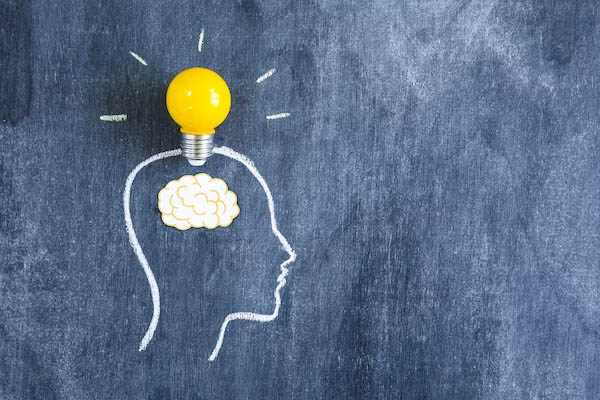
This is why I could tell a person, “I receive a call from your mother. She’s in the hospital.” It’s not real. I made it up but the person start sweating. They start imagining the worst and as a result, their body reacts to it. Their heart rate is faster. The same applies here. I could close my eyes. I hear the alarm going on. I jump from bed, turn it off and start my day. In 10 minutes, I can replay it probably 20 times. I can play the same scene over and over again and it will speed up the process.
The Joe next to me practices 7 times a week and I practice 140 times the same week. I will develop the habit of waking up early much faster than him. That’s the first benefit of visualization, which is speeding up the process. The second is I believe visualization creates evidence so we believe that our goal is possible. To illustrate, when I started, I’m this Uber Eats delivery guy making less than $1,000 a month. All of a sudden, I set a goal that in 90 days, I want to make $10,000 a month in profit.
I’ve never earned that money before. I never had that money even in my bank account so I didn’t believe it. If I don’t believe it can happen that quickly, I wouldn’t take many actions. What’s the point? I’m not going to achieve it anyway. However, what I did is close my eyes and visualize it. I woke up. I checked my Stripe account and I see there is $10,000.
I jumped from the bed and started shouting. I run to the living room and said, “Mom, dad, I did it.” We celebrated. I would replay it over and over again and then what happened? I started to believe it was possible because I had enough evidence that I’d already done that. I believe that visualization can help people create the belief that something is possible and that helped me achieve that goal in 90 days.
I was at an event and they have a huge bonfire outside of the event. It’s probably 5×5 feet. The wood is stacked. It is so hot that you cannot get within maybe 30 feet of the fire. The reason they were doing that is they were burning that down to coals and then they laid the coals out on the ground. We then took off our shoes and socks. My normal brain says, “I can’t do this.” They lay out 15 feet of coals, 1,200 degrees. They ask for somebody to go first. I’m a go-first kind of guy.
They encourage us to visualize that the coals are ice cubes. “Don’t look at them. See them in your mind as if they’re ice cubes. Look straight ahead. When I say go, walk briskly. If you get in trouble, step off the coals.” I walk briskly. It’s warm. I don’t get burned. I don’t get blisters. My feet looked a little charred or ashy I guess all because, in my mind, I saw it as not a great big deal.
We had about 50 of us. When they were all done, I was like, “I want to go again.” Two times across the coals and so much of it has to do with what you believe is possible. There was an old book. It was probably in the ’50s or ’60s written by Dr. Maxwell Maltz. It’s the Psycho-Cybernetics. I love that book. One of the stories was there were two basketball teams. One team was going to spend an hour a day shooting free throws, and one team was going to go lay under a shade tree and imagine shooting free throws.
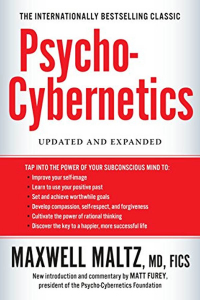
At the end of the month or whatever the timeframe was, the team that was in the gym shooting free throws improved by 2% or whatever the number was, but the team made every free throw, because in your mind you can be perfect, went up 4 times that amount. It was a great illustration of what’s possible in your mind. I don’t think your mind knows the difference between what you experience and what you tell it you’re experiencing.
That’s right. It doesn’t know the difference. It’s such a great example and I’m glad you did the fire walk. I did it a few years back with Tony Robbins. He did it. It increased my belief in what is possible. How many times I would touch a hot oven and I would immediately get a blister? Hot coal is even much warmer than that but I didn’t have any blisters. It’s because as you did, you visualize the ice cubes. I’m so happy you’ve done it.
I did a post on social media about it, and the questions were like, “Why? Did you lose your mind? Are you trying to be macho? Do you think you’re Superman?” I was like, “No. For humans and me too, I’m human, we have self-limiting beliefs. We have beliefs that aren’t true but because we believe them, it limits what we can achieve and perform.” I looked at the fire walk as a self-limiting belief knowing that Tony Robbins has walked 100,000 people. A lot of people have done it.
We have beliefs that aren't true, but because we believe them, it limits what we can achieve and perform. Click To TweetThey laid out two strips. On one side, they said, “This side is spicier.” They would never say hot or use any of those words because those plant certain images. I’m like, “I want the spicy side.” It was so much fun. I’m dying to ask. Seven days in the dark with no food. 168 hours, 86,400 seconds times 7. Tell us what your motivation was, why you did it, how it went, and what you learned. Tell us everything, Vash.
Let’s go straight into it. To trace it back so you can understand why, I started a coaching company called Mindtrepreneur, where we help over 1,000 entrepreneurs from 45 countries achieve their goals faster by what we call mastering their mindsets, overcoming their limiting beliefs and fears, killing procrastination and all of these things that slow people down from growing their businesses.
Also, you mentioned self-image, for example. I’m a big believer in visualization, meditation and spending time with yourself. That’s where the greatest ideas come in. I always don’t want to walk the path. In a way, if I tell people to meditate for 15 minutes, I will meditate in 1 hour to walk the path and show them that I’m the guy who can do it and I can guide them thoroughly.
The same happened here. I was talking to people that once a month or at least once a quarter, they should take three days off with no electronics. Maybe book a nice cottage or cabin somewhere in nature. They should spend three days thinking about where they’re going, how they want to get there and why they want to achieve it. With these things in silence without electronics, devices and being distracted, we have the best ideas.
I wanted to take it to the next level. I wanted to go deeper so I can show people the way. That was the motivation. For seven days, I go in complete darkness. The second motivation is I run three businesses. I haven’t gone offline for more than probably 40 hours. I’m always online checking if my team is okay or there are no fires but having seven days with no phone and not knowing what is happening with the businesses, I was like, “That’s a big challenge.”
Anytime I feel this fear but at the same time a little excitement, I know I need to say yes. It’s almost like the higher self is shouting, “Do it,” and the limiting self is almost like, “No, this is dangerous.” I said, “Yes, I’m going to do it.” I was like, “Let me remove all pleasures that can be there.” There won’t be any electronics. I won’t see and hear anything. Let me take the last thing, which is I won’t taste anything.
I said, “Let me prove to myself I can do it on water only.” It was such a deep experience because first of all, I realized that I’ve never spent so much time with myself. It means that I’m always on my phone or computer jumping from LinkedIn, email, Slack and Instagram to Twitter. I am all over the place but here, I have the time to think about what I want from life. Sometimes we set these goals but they’re no longer relevant or somebody else set these goals even for us.
I had time to think, “What do I want to create in this life? What impact do I want to have? What do I want to create? What do I want to experience?” There I realized this big thing. On paper, I live an incredible life. I traveled to fifteen countries. I took multiple amazing vacations. I met amazing people. I helped incredible people but at the same time, I didn’t fully experience it.
I might be having an amazing vacation but I’m thinking about work. At work, I’m thinking about a vacation. I’m always thinking about what’s next and what’s on my to-do list. As a result, I wasn’t present. In the darkness, I realized the power of being in this moment, being here with you and not thinking about what I need to do after this show. Those were a few of these biggest lessons I would say.
There are so many things in there. You are so wise and young, Vash. One, I’m a big believer that our creative mind is of the most value. The logical mind is the mind that goes to university and learns things. That’s all good. In society, we place a lot of value on that but genius doesn’t happen there. Genius happens from our creative mind which is why there are so many genius artists. Steve Jobs was a genius artist. He didn’t paint, sculpt or write music. He had a vision for this unbelievable technology company and built this mammoth company. It wasn’t because of what he learned in university.
In the darkness, what happened was the ideas that were coming to me were not these 10% improvement ideas like, “Do we hire this person or fire this person?” It’s not these marginal improvements. They’re usually logical. It was like, “Message this person.” I was like, “I never thought about it, start this product or reach out to this person.”
The moment I applied it and once I came back, I was like, “This shifted in my life.” I started to research inventors, the people who invent things. They rarely invent something by having a whiteboard and calculating stuff. They usually are overlooking the ocean and it is a download to them. It comes and all of a sudden, they got the idea and then they need to justify logically what happened there. What I realized is when we enter silence or are without distractions, it’s almost like the creative mind can connect almost to a Wi-Fi signal and that’s when big ideas start coming to us. I’m so happy you mentioned that.
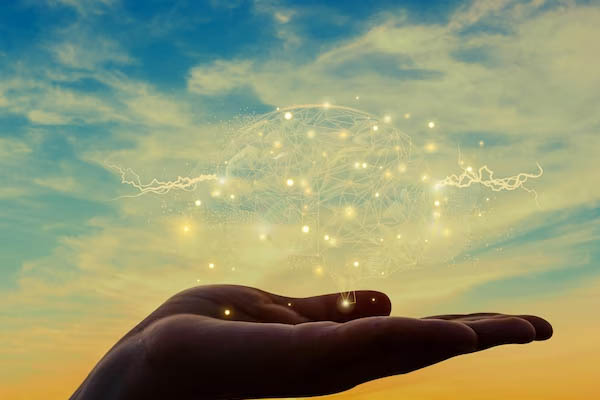
In the Christian faith and probably in the other major religions, one of the tenets is, “Be still and know that I am God.” I’m sure the other major religions have something very similar to that but there is real power in getting quiet and shutting out the noise. We live in a noisy world and many times, it involves nature. Go to the beach or get on top of the mountain. Get away and refresh.
The root word of recreation is to recreate, which if you emphasize it differently, it’s recreate. Many times, entrepreneurs, salespeople or business people get it in their heads like, “I got to work harder and faster. I got to get more done. Chop that log. Milk that cow. Do whatever,” when the magic might happen if you tone it down, you get quiet. You go to the cottage in the woods, the top of the mountain, the beach, in your backyard or the city park and get real quiet and let your creative mind talk.
A few years ago, the mammoths of technology, Google, Facebook, Instagram and Apple had a huge shift. They said it no longer requires a Bachelor’s, Master’s or PhD to come to work there. What we found are these geniuses that are self-taught or maybe intuitive. We don’t know but we don’t care. That’s where the great stuff is coming. It sounds a little silly but when you look at the founders of those companies, many of them did not complete university.
The two guys at Google dropped out of Stanford. They said, “It’s too expensive for us to stay.” I want to encourage all our readers. Don’t have self-limiting beliefs because you think you don’t know enough or you haven’t gone far enough. It couldn’t be further from the truth. We’re all 1 idea, 1 phone call, 1 client and 1 event away from huge success. You went 63 days with nothing and on the 68th day, something happened that made all the difference.
That’s the point because, in business, people tend to feel behind so they start compensating, “I’ll put in longer hours. If was working 12, I will do 16,” but it’s almost like the whole time they could be working so hard on strategy A that is not working. They could take a step back, take 1 day off or 2 days off and realize that there is strategy B that would get them 10X results by working 6 hours a day.
That’s the power of taking a step back but in this hectic society and environment, people almost feel they can’t stop or take time off. For me, working smart means slowing down, looking at the bigger picture and letting those new ideas come in so we can execute them. I know a lot of people who are extremely hard and sometimes they don’t even get the results.
With many of my clients, it’s eliminating extraneous activity. Truthfully, I believe you should only work in areas where you can be magnificent. If you’re very good at something but somebody in your company is almost as good at something, give it to them. Let it go. You have zones of incompetence, competence, excellence, and magnificence. To me, that zone of excellence is a temptress. I do all these things well so I like to play there but here’s how you know. It’s in your zone of excellence if it’s safe.
You should only work in areas where you can be magnificent. Click To TweetIf you know you can do it, it’s not your zone of magnificence. In your zone of magnificence, you could fail. It’s out of your comfort zone but that’s where your best work happens. It doesn’t happen in that safe area where you’re very good. I’m going to ask you a question. I want you to think about a hard lesson. What is something that occurred that when it occurred, you’re like, “Ouch. That hurts a lot,” but looking back and having a little distance, you’re like, “Maybe it was the best thing that happened to me. It wasn’t as bad as I thought,” but at the time, it was really heavy. Do you have a hard lesson you can share with us, Vash?
Yes, I have and I like that you said you can connect those looking forward. You can always look back and realize, “It was the greatest thing that happened to me.” The biggest, I would say, lie is once you achieve the external things, you will start feeling differently inside. I realized that’s the biggest lie. What I thought was, “I don’t feel good enough. I felt a lot of insecurity and fear but once I make the first money from my business, all will be good. Once I get the car and house, all will be good.” I set a bigger goal and achieved them but the feeling didn’t go away.
That’s why we know celebrities who are depressed have anxiety. We have everything externally but almost something is missing internally. I coach loads of people who are even on the Forbes list of the Czech Republic and they come to me like, “Vash, I have everything externally but there’s so much emptiness inside.” That was probably the biggest lie when my goal on a pedestal was almost like, “Once, I achieved it, everything will fall in place,” and that wasn’t the case. I tell people that it’s important to first change the inside. Nothing external will change that feeling. We need to change that.
There are so many nuggets. What’s a high-value nugget you haven’t shared with us yet?
Let me choose the best one. This is a very cool thing I discovered. A few years back when I started this, I call it the hockey stick effect. I believe that it will help a lot of people. I realized that a lot of people think that progress happens linearly. Let’s say I said that in 90 days, I want to hit $10,000. How the human works are in 30 days, I should be around $3,000. In 60 days, I should be at $6,000, and around day 90, I should hit it.
What happens is it never happens like that. Even with getting in shape, people think, “Next month, I will lose 2 kilos or 2 pounds,” or whatever it is. What happens is you go to the gym for a month and you see barely any results. I use some personalized videos for 60 days and I’ve seen 0 results. I tell people that progress happens exponentially. If the readers are truly interested, you can type in Google Tesla’s revenue, Apple’s revenue or Warren Buffett’s net worth and you will see the same line. It’s like a hockey stick. There is not much and then boom.
Progress happens exponentially. It's better to be consistent than being intense. Intensity makes a good story, but consistency makes progress. Click To TweetFor me, it’s 0 and then $10,000. Even with getting in shape, somebody goes three months with not much results and then you met him and he said, “What happened to you?” It happens almost overnight. To activate this hockey stick effect or truly experience that, I believe in the power of consistency. You can’t go to the gym once and be fit for life. You can’t learn sales for an hour and expect to be great at sales. It’s being consciously repeating it every single day. I tell people it’s better to be consistent than to be intense. Rather than doing something for a week intensely, let’s do it for three months, a little bit less but consistently every day. Intensity makes a good story but consistency makes progress.
This is the hardest question I ask. I am going to take you back to your eighteen-year-old self. You get 60 seconds to share 1 or 2 thoughts with your 18-year-old self that you know now but you didn’t know then, and it would’ve helped you had you known that. It’s not that far for you. When I get somebody who’s 50, they’re like, “I wish I knew this and that.” If I take you back to before you took your first step on your entrepreneurial journey, what would be the most important thing you could tell yourself?
First, “Vash, your past doesn’t dictate your future. Just because you failed at something in the past, it doesn’t mean you will fail at it in the future.” “Stop being on the bench. Get in the game. Start playing. Start taking action and taking risks. You have nothing to lose.” That would be second advice. Another piece of advice I would give myself is, “Vash, you deserve the best.” If society, your parents or friends tell you you’re not good enough, it’s not true. You deserve the best and you can have anything you set your mind to.”
Number four would be thinking about it, “Vash, first, sit down and ask yourself what you want.” Until you know what you want, you can’t achieve it. Dedicate a few days to thinking about what you truly want, craft a specific plan of action, and execute it daily, “Vash, don’t forget to enjoy the journey. Life is a journey.”
Thank you so much for sharing your wisdom and time on the show.
Thank you so much for this amazing show you’ve created it. You’re doing an incredible job. I read all the reviews and there are thousands. I wanted to congratulate you and also, thank you for the opportunity to be here.
Thank you very much. I assure you, it’s all due to my wonderful guests like you. See you next time. Bye.
Important Links
About Václav (Vash) Tomanec
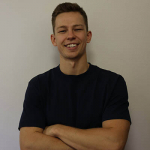 Vash is a 25-year-old serial entrepreneur who has built three successful seven-figure businesses. With his latest venture, Mindtrepreneur, Vash is on a mission to help 1 million entrepreneurs transform their business and live more fulfilled and joyous life by mastering their mindset. He does it through 1-1 and group coaching, various online programs, in-person masterminds hosted 4x per year.
Vash is a 25-year-old serial entrepreneur who has built three successful seven-figure businesses. With his latest venture, Mindtrepreneur, Vash is on a mission to help 1 million entrepreneurs transform their business and live more fulfilled and joyous life by mastering their mindset. He does it through 1-1 and group coaching, various online programs, in-person masterminds hosted 4x per year.
Recently, he spent seven days in complete darkness with no food for an intense meditation, further demonstrating his dedication to personal growth.
Vash is known for his inspiring, present, loving, and driven nature. He is obsessed with helping people level up and live their most fulfilling lives, and he loves mastering subjects rather than just dabbling in them. His frameworks and principles have helped over 1,000 people from 35 countries. He is skilled at using the power of the subconscious mind to achieve his goals faster and live a better, more fulfilled life.
In addition to his dedication to personal growth and helping others, Vash is also passionate about biohacking and finding ways to stay productive and disciplined. He spends a lot of time researching and experimenting with different techniques and strategies to optimize his health and performance.
Vash’s passion for meditation, personal growth, and the science of happiness has also led him to share the stage with renowned expert Dr. Joe Dispenza in 2022
Highlights:
- Co-Founder of Mindtrepreneur, a coaching company that helped 1000+ entrepreneurs to master their mindset
- Founder of BullAds, a social media marketing agency working with 50+ brands
- Founder of EcomTrack, a SaaS tool that allows ecommerce stores to get accurate data and scale with certainty.
- In 2022, he received the Two-Comma Club Award from ClickFunnels founder, Russell Brunson
- Finished a 7-day intensive meditation retreat in the complete darkness
- Dr. Joe Dispenza invited him to share his story in front of 5,000+ people
- Co-host of the Mindtrepreneur Podcast
For information on how to work with Don visit Work With Donk Williams
You can also reach out to Don Williams at https://donwilliamsglobal.com
Please join Don and his businesses in support of St. Jude’s Children Research Hospital in its Mission to cure Childhood Cancers. You can donate to St. Jude at stjude.org/donate.
